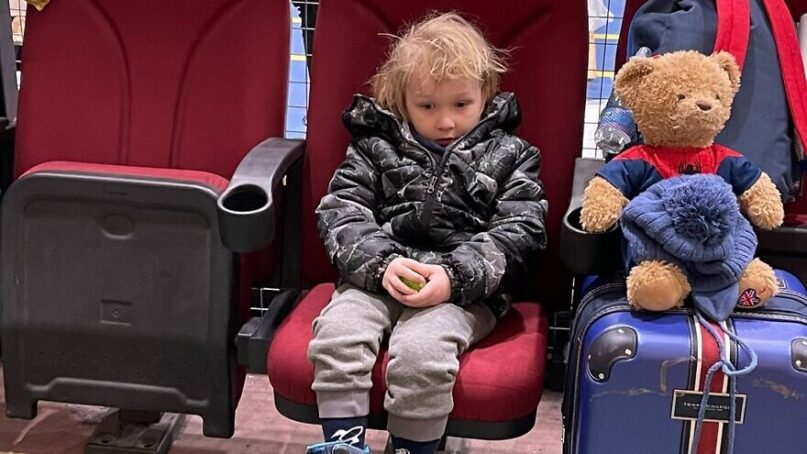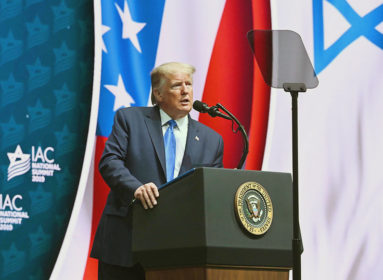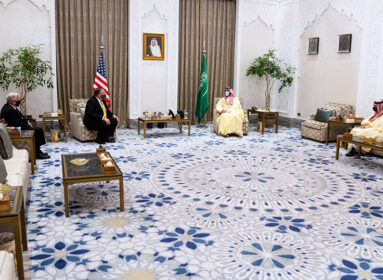
By Israel Kasnett
(JNS) Tears rolled down Yelena Shevchenko’s face as she recalled her terrifying experiences when Russia attacked Kyiv in the early weeks of its war against Ukraine.
Russia has fired countless rockets at Ukraine’s capital city and destroyed critical electricity infrastructure. Between Feb. 24, 2022, when Russia invaded Ukraine, and Feb. 12, 2023, the Office of the U.N. High Commissioner for Human Rights (OHCHR) recorded 18,955 civilian casualties in the country: 7,199 killed and 11,756 injured.
Sitting in the dining room of a small hotel in Chisinau, Moldova, the night before her flight to Israel, Shevchenko described how she lived on the 15th floor of her apartment building with no working elevator due to the lack of electricity. Her inability to climb up 15 flights meant she had no way in or out of her apartment. Stuck, she sat in darkness and wallowed in despair for months, along with millions of other Ukrainians.
“We don’t understand why this happened to us,” Shevchenko, 63, lamented. “People are left in darkness without electricity and water. We are suffering. It is so difficult for me to describe what I experienced. I know people from childhood who were killed. I am crying and falling apart.”
As she described her experience, two other women began to cry and one had to excuse herself from the room.
Shevchenko said her greatest dream is to spend time with her children and grandchildren who live in Hadera and Be’er Sheva. Before the war, they used to visit her in Kyiv. Shevchenko could not leave until now because she was caring for her mother-in-law. After she died a few months ago, Yelena decided to make aliyah.
“I don’t want them to worry,” she said. “I want to be with them.”
The special aliyah flight that brought 93 Ukrainian Jews to Israel last week was arranged and sponsored by the International Fellowship of Christians and Jews (IFCJ).
According to IFCJ, the organization has committed more than $26 million towards helping thousands of Ukrainian refugees fly to Israel and set up new homes and livelihoods over the past year, building on the NGO’s 30-year involvement in supporting immigration to Israel. Over those three decades, IFCJ has invested more than $200 million in assisting the aliyah of 750,000 people, many of them coming from the former Soviet Union.
IFCJ funding also supports the ongoing integration into Israel including welfare assistance for needy immigrants, particularly families and the elderly. This is made possible in partnership with the Joint (the American Jewish Joint Distribution Committee, or JDC) and Colel Chabad.
Two countries
Katya, 22, from Kyiv, told JNS her greatest fear in moving to Israel is the language. Her parents have already been in Israel for a year and a half while she stayed behind to complete her studies. Now that she graduated, she wants to be with her parents and brother.
“I love Israel,” she told JNS. “I think it’s a great country.”
Katya said she has two countries—one of her family and one of her soul.
“Ukraine and Israel historically have been involved in war,” she said. “I experienced terror attacks in Israel and rocket attacks in Ukraine. It is so painful.”
Nothing prepares you
JNS visited a family in their Odessa apartment the day before they moved out and traveled across the border to Moldova from where they would eventually make aliyah.
Andrey Orlikovsky, 33, his wife, Victoria, 29, their daughter Sofia, 5, Andrey’s mother, Marina, 61, and Andrey’s grandmother, Alina Konevskaya, 85, all decided to move to Israel to escape the war. They lived in Odessa and stayed there since the war began, unable to leave since Andrey’s father and grandfather were both sick and needed care.
“The war began very unexpectedly. Everybody talked about such a possibility, and there was a lot of information in the news, but when you get awakened in the middle of the night by the sound of rockets in your street, you don’t expect that, and nothing in your whole life prepares you for that,” said Andrey.
“I never imagined our generation would be able to identify weapon sounds as easily as we do now. It is horrifying. I remember that night, February 24, 2002. The first thing I did was grab our daughter from her bed and run with her to the staircase.
“When we got downstairs, we met many neighbors who were leaving. I asked my neighbor, a father of three kids, where he was going, and he didn’t know,” Andrey continued.
“It is dangerous everywhere, but when we move, there is an illusion that we try to save ourselves,” he said. “We said goodbye, but both of us felt like we were not sure if we would meet again.
“I always thought that there was one thing that I was fully sure of—my ability to protect my little girl. However, I understood that protecting Sofia was one of many other things that I was totally incapable of. For a father, this feels like a physical pain,” Andrey said.
“One of the most difficult aspects of our lives during the war has been a lack of income. I lost my job on the first day of the war and couldn’t find a new one for six months. My wife couldn’t work because she needed to stay with our daughter; there were no kindergartens equipped with shelters, so she stayed with us. We don’t want Sofia to get stressed, so we didn’t tell her there was a war; we just defined this situation as a temporary inconvenience. However, she understands much more than we could imagine, she asks questions, and she feels terrified when there are rocket attacks.
“My mother and my grandmother came to stay with us because they needed help and are not so young.
“From time to time, I succeeded in finding some temporary jobs as a loader or a cleaner. We needed money so I was ready to do any job. People are forced to live almost entirely without electricity, as it is turned off many times a day. So people need wood. They can burn it and get some warmth. That is why the wood market has become very active in the last several months. So I found a job thanks to this market. Still, it is challenging to exist with such a modest income,” he said.
Andrey thanked IFCJ for its assistance. “We were so lucky to get some financial support, food and medicine. It was really life-saving.”
He also thanked IFCJ for playing an important role in his family’s aliyah. “They helped us with the information, the contacts of the councils, the arrangements for transportation, and the airline tickets to Israel. The process of our aliyah was not easy, but thanks to the Fellowship’s assistance, we organized everything very quickly.
“Making aliya was always my dream,” added Andrey. “Unfortunately, we were not able to come to Israel sooner because my grandfather was seriously ill and then my father too. We couldn’t leave them, so we stayed in Ukraine with them.”
Mark Dovev, the representative in Moldova of Nativ, a body in the Israeli Prime Minister’s Office that deals with Jews in the former Soviet Union, outlined the organization’s efforts to help those who wanted to move to Israel. More than 17,592 requests for help were processed since the start of the war for people coming from Poland, Hungary, Romania, Moldova and Ukraine, he said. Nativ issued approximately 2,500 entry permits into Israel to be further processed in the country. The idea was to allow them to arrive in Israel and complete the processing there so as not to keep people waiting in limbo.
The Nativ organization, founded in 1952 at the initiative of the then-prime minister, David Ben-Gurion, has worked for decades to preserve the ties between the State of Israel and Jews in the Diaspora, helping them make aliyah from the countries in which it was operating. Nativ has the exclusive professional authority to check the eligibility for aliyah of people born in the FSU countries, and is authorized to issue aliyah visas. It has acted as one of the most important and necessary conduits for Jews to make aliyah as they escaped from Ukraine to Israel.
A line of cars 40-km. long
Dovev described his experience escaping to Moldova. A religiously observant man, he drove for hours on Shabbat, Feb. 26, 2022, to escape from Ukraine. He described what he saw as he drove from Lviv in western Ukraine to Warsaw in Poland.
“I saw a line of cars 40-km. long,” he said. “People were crying and cursing us because we were a convoy of consular cars cutting the line. One woman even tried to give us her baby to save her. Now we know a genocide did not occur, but at the time, at the beginning of the war, people did not know what would happen and assumed the worst.”
When the Russian invasion began, IFCJ faced the task of saving the lives of hundreds of thousands of people who became refugees overnight. IFCJ raised approximately $30 million for the leading Jewish organizations in Ukraine, and operated in the field in real-time, around the clock, in cooperation with the JDC, Chabad and other organizations. Their activities included the establishment of emergency hotlines, strengthening the community’s security system, evacuating people to the border, organizing sleeping accommodations and shelters, purchase of food, medicine and emergency supplies, recruitment of volunteers, establishing a support and assistance line, and providing psychological/emotional assistance.
At the same time, IFCJ worked in collaboration with Nativ, the Jewish Agency and the Ministry of Aliyah and Integration to bring on aliyah to Israel those whose lives changed suddenly.
Since the beginning of the invasion, IFCJ the JDC, Chabad, and the Jewish community in Chisinau have been jointly operating a system of hotels in Moldova where thousands of Jews who fled the war zones have arrived. IFCJ staff were at the border crossings in Moldova and accompanied the thousands of Jewish refugees while providing assistance in locating emergency shelters, distributing food, and resolving the bureaucratic entanglements in preparation for their aliyah and their integration in Israel.
More than 5,000 olim have moved to Israel from Moldova since the start of the war. During the first weeks, an emergency flight took off every day carrying hundreds of immigrants. IFCJ then loaded a total of more than 100 tons of humanitarian cargo on the returning planes, in cooperation with Chabad, JDC and Latet.
Now, IFCJ is providing an aid grant intended for Jewish communities in Ukraine and other countries of the FSU. The grant will finance food aid, medicine, shelter for those whose homes were damaged, clothing, electrical products, electric blankets, gas stoves, radiators, heating sleeping bags, generators, heating equipment and more. This is a special emergency grant in addition to the approximately $20 million that is provided annually for basic needs, food and accompaniment of approximately 70,000 elderly and needy families, and medicine and security in the communities.
“We can’t wait to come to Israel,” Andrey told JNS. “I visited Israel only once. This is a beautiful country with people who are so kind and generous. I want my daughter to grow up in this land, and thanks to the IFCJ this is really happening.”
Main Photo: A Ukrainian child waits for a place to stay at a refugee center in Moldova, March 2022. Credit: Courtesy.







 Southern New England Jewish Ledger
Southern New England Jewish Ledger














